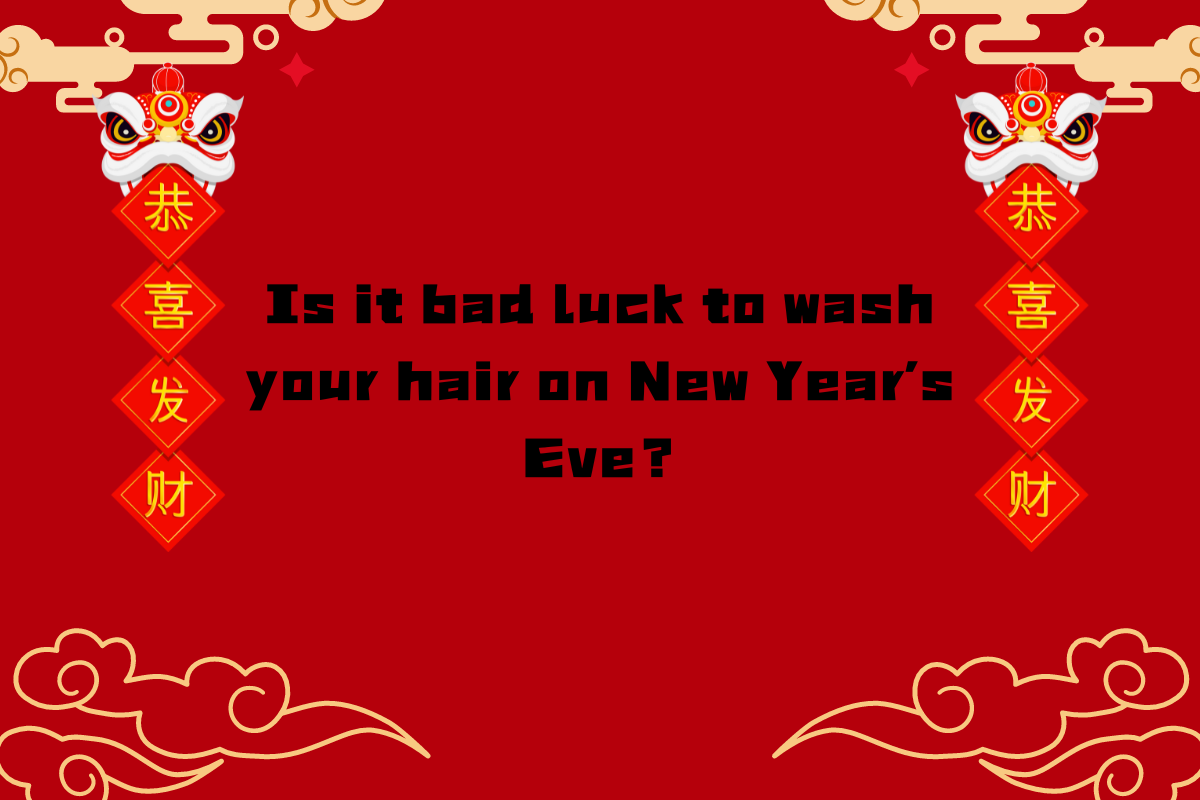Is it Bad Luck to Wash Your Hair on New Year's Eve?
In Chinese New Year, people around the world engage in various customs and traditions to ring in the new year with prosperity and good fortune. However, among the many superstitions surrounding New Year's Eve, one question that often arises is whether it is bad luck to wash your hair on this auspicious night. In this post, we'll explore the origins of this superstition and examine whether there's any truth behind it.

The Superstition
According to folklore and tradition, it is believed that washing your hair on New Year's Eve may wash away good luck and fortune, leaving you vulnerable to misfortune and bad luck in the coming year. This superstition is particularly prevalent in some Asian cultures, where certain rituals 仪式 (yí shì) and taboos are observed to ensure a smooth transition into the new year. As a result, many people avoid washing their hair or engaging in other activities that may bring about bad luck on New Year's Eve.
仪式 (yí shì), noun, ritual
Examples:
- The wedding ceremony was filled with beautiful rituals.
婚礼上充满了美丽的仪式。
hūnlǐ shàng chōngmǎn le měilì de yíshì. - During the festival, people performed traditional rituals to honor their ancestors.
节日间,人们进行传统的仪式来敬祖先。
jiérì jiān, rénmen jìnxíng chuántǒng de yíshì lái jìng zǔxiān.
Origins and Interpretations
The origins of this superstition are unclear, but some believe it may have originated from ancient beliefs and practices related to hygiene and spirituality. In many cultures, hair is considered a symbol of vitality, strength, and energy, and washing it on New Year's Eve may be seen as a symbolic act of cleansing and renewal. However, others interpret the superstition differently, attributing it to the belief that water, being a powerful 强大的 (qiáng dà de) element in many cultures, has the potential to wash away not only physical dirt but also metaphysical energies and blessings.
强大的 (qiáng dà de), adj, powerful
Examples:
- The king possessed a powerful army to defend his kingdom.
国王拥有一支强大的军队来保卫他的王国。
Guówáng yōngyǒu yī zhī qiángdà de jūnduì lái bǎowèi tā de wángguó. - The superhero displayed powerful abilities to defeat the villain.
超级英雄展示了强大的能力来打败恶棍。
Chāojí yīngxióng zhǎnshìle qiángdà de nénglì lái dǎbài ègùn.

Debunking the Myth
While the superstition of not washing your hair on New Year's Eve may be deeply ingrained in some cultures, there is little empirical evidence to support its validity. In reality, whether or not washing your hair on New Year's Eve brings bad luck is purely a matter of personal belief and cultural tradition. Many people choose to follow this superstition out of respect for tradition or as a precautionary measure, while others dismiss it as nothing more than a myth with no basis in reality.
- I always wash my hair on New Year's Day to start the year feeling fresh.
我总是在新年洗头发,以清新的状态开始新的一年。
Wǒ zǒng shì zài xīnnián xǐ tóufa, yǐ qīngxīn de zhuàngtài kāishǐ xīn de yī nián. - My mother believes it's bad luck to wash your hair on New Year's Day.
我妈妈认为在新年洗头发是不吉利的。
Wǒ māma rènwéi zài xīnnián xǐ tóufa shì bù jílì de. - Some people follow the tradition of not washing their hair on New Year's Day.
有些人遵循不在新年洗头发的传统。
Yǒuxiē rén zūn xún bù zài xīnnián xǐ tóufa de chuántǒng.
Related Articles
- Can You Sweep the Floor During Chinese New Year?
- Why do People Visit Relatives During Chinese New Year?
- What are the 4 most Interesting Facts About Chinese New Year?
- What is the Evil Spirit in Chinese New Year?
- What Decorations are Used at Chinese New Year?
- Best Traditional Chinese New Year Activities (Part Three)
- Best Traditional Chinese New Year Activities (Part Two)
- Best Traditional Chinese New Year Activities (Part One)
- Chinese Red Packet Tradition: Traditional Blessings and Festivities
- The Dining Traditions and Symbolism of Chinese New Year that You must Know
- A Taste of Tradition: Comparing Northern and Southern Chinese New Year Feasts
- Lucky Food in Chinese New Year